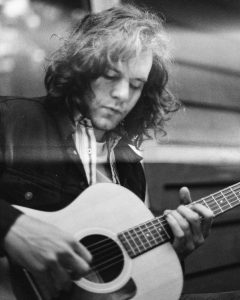It was four or five years ago. “I was trying to write a song,” Alex Burger remembers, “but it just wasn’t working. I was looking for weird chords, and at some point, I just gave up. I played a G and a C and I awakened a ton of stuff in me. It made me realize that the simpler the music, the better my writing.”
 Among the things that were stirred up by this epiphany were a few precious childhood memories, chief among them remembering Paul-Émile, his grandfather, who played country music almost all the time, “morning and noon, but not at night, because that’s when my grandma was watching The Young and the Restless.”
Among the things that were stirred up by this epiphany were a few precious childhood memories, chief among them remembering Paul-Émile, his grandfather, who played country music almost all the time, “morning and noon, but not at night, because that’s when my grandma was watching The Young and the Restless.”
The song inspired by this revelation was “Pays chauds,” which figured on Alex Burger’s first EP À’ment donné (2018), and he’s still continuing his journey under the auspicious skies of country simplicity on Sweet Montérégie, his first full-length album – where the eternally melancholy ghost of Gram Parsons is omnipresent. Records made by the late Parsons – a young martyr of American country-rock, and spiritual father of alternative country – were played a lot in the tour truck of Prix Staff (Burger’s band), as were those of country outlaws Waylon Jennings and Merle Haggard.
And although Sweet Montérégie can proudly claim its country label, it’s much less attributable to a strict obedience to a sonic palette than to the fact that Alex Burger reminds us, on many occasions, of a pillar of truth: a good country song is often on the borderline between drama and comedy, farce and tragedy.
“It’s serendipitous that you would say that, because I don’t like humorous music, but I don’t like overly dramatic music either,” says the Saint-Césaire-based cowboy, laughing. To this scholar of country music, the genre certainly isn’t the object of ridicule that so many Québec artists have made it out to be.
Playing for the Right Reasons
As the self-portrait of a road warrior for whom touring both provides an escape and reveals the truth, Sweet Montérégie is, for Burger, the culmination of several years of wandering the secondary roads of the wonderful yet grueling world of music. During the first half of his twenties, Alexandre Beauregard worked tirelessly within the math-folk band Caltâr-Bateau, then, disillusioned that his rock dream didn’t materialize quickly enough, left the ship to take refuge in the darkness of blues bars. At 30, the guitarist became, for a while, the accompanist of harmonica player Billy Craig and “other old, mangled guys who looked like a few trucks ran over them.”
This stint would, however, teach him to make music for the proverbial good reasons again. “I was fascinated to see these guys who don’t play for pay or exposure on a Sunday afternoon in a dive bar where there were no opportunities for networking or development,” he says.
But before going completely over to the dark side and remaining glued to the top of the bar, Burger finally got back to writing, and created a handful of new songs that he performed on the contest circuit (he notably won the SOCAN Paroles & Musique award at the 2019 Francouvertes). “I spent a lot of time in meetings at record companies, but in the end, everyone was afraid I’d make an album that was too country, or too metal,” says the man who ended up co-producing Sweet Montérégie with Alexandre Martel (Mauves, Anatole). “Everyone thought I was ambivalent.”
Yet it’s this very ambivalence, or rather, this richness, that gradually transforms Sweet Montérégie into an addictive drug, from the dance-rock of “C’est pas le pérou,” to the ethylic pastoral folk of “Chanson pour Simon,” not to mention the very Stephen Faulkner-ish honky tonk of “J’prends pas ça pour du cash,” the (vaguely stoner) southern rock of “Hiking,” and the Americana of the sublime “Dormir sur ton couch” – which offers us a stellar pedal-steel guitar played by David Marchand, with a direct lineage to the aforementioned Gram Parsons.
“Labels are often looking for something new, the next big thing, they want to take a risk on something people don’t know much about, but they think is going to be cool,” says the musician, who also plays with Mon Doux Saigneur and Bon Enfant. “I’d sometimes get the feeling that what labels were looking for was the Montréal sound. But I want to play outside of Montréal, I don’t want to be just a singer from Montréal. I want to touch people everywhere in Québec.”
Despite the spleen that permeates the verses on Sweet Montérégie, it remains one of those rare albums apparently created with the intention that no one will be able to remain seated when it’s played live onstage. It’s festive music, you could say, were it not for the fact that the adjective is so frayed. It’s festive in the noblest sense: unifying, communal, cathartic.
“When I finish a tune, after finding the chords and writing the lyrics, the third step is always to play it by visualizing myself at Quai des Brumes, or a venue like that. That’s when I’ll fine-tune it by changing a line, or removing a pause, so that the song isn’t just about me and becomes universal.” Well… Job done.